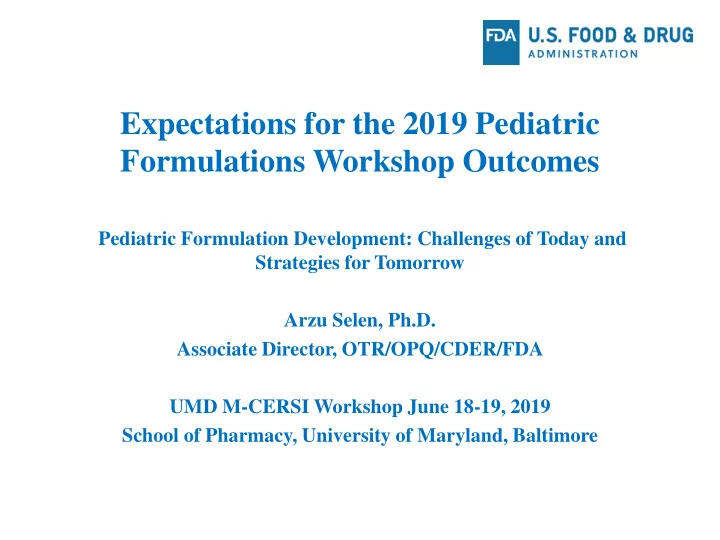

Expectations for the 2019 Pediatric Formulations Workshop Outcomes Pediatric Formulation Development: Challenges of Today and Strategies for Tomorrow Arzu Selen, Ph.D. Associate Director, OTR/OPQ/CDER/FDA UMD M-CERSI Workshop June 18-19, 2019 School of Pharmacy, University of Maryland, Baltimore
Disclaimer: The material discussed in this document also include individual and collective opinions for generating discussion and are not being formally disseminated by the United States Food and Drug Administration and should not be construed to represent any Agency determination or policy. 2
Some Drivers/Catalysts bringing us together for advancing pediatric formulations 1) Area of unmet need and of significant global impact as evident in the growing needs for: – Accessible age-friendly pediatric medicines – Acceptable drug products for ensuring adherence to the prescribed treatment 2) Complexity of advancing pediatric formulations and dosage forms requires – integrated multidisciplinary/multispecialty and multidimensional collaborations for framing and solving problems, and – for generating/sharing/leveraging critical knowledge for sustained benefit 3) Robust, and long term solutions require – Building partnerships and – Advancing integrated communities for shared expectations through better risk awareness, risk balancing and risk alignment 3
The outline of my talk 1) Some Drivers/Catalyst for this workshop 2) Outline 3) Workshop goals 4) Catalysts for change 5) Bird’s eye view of the program – The two-day program – Points to consider, ideas generating ideas 6) Deliverables: During and after the workshop 4
Workshop Goals in the Program 1) Sharing knowledge (e.g., practices, issues, and challenges in pediatric drug development) 2) Exchange of ideas and experiences in pediatric drug development for age-appropriate formulations 3) Clarifying data needs for integrated risk assessment and identifying best practices for generating data for global use. And Be present and participate and make it happen! Breakout sessions and panel discussions are approx. 80% of the program. 5
Catalysts for Change: Impact on Global Health Care Projections for 2050 For 2015 Children (under 19 years of Children (under 19 years of age): age): In the USA: Approx. 25% of In the USA: Approx. 25% Pp TTheh ? the US population (389 M) of the US population(322M) And And In the world: Approx. 28% In the world: Approx . of the world population (9.7 34.5% of the world Billion) population (7.35 Billion) Possibilities?: Positive impact of access to age-friendly medicines and acceptability of drug products (i.e. adherence to treatment) Source: www.populationpyramid.net/united-states-of-america/2015/ also for the world projections 6
Advancing Development of Pediatric Drug Products Requires Integrated Efforts 1) Patient and drug product understanding/knowledge – Therapeutic needs of the targeted patient population (heterogenous population from preterm to young adults) – Getting to the right drug, right dose, right dosage form/formulation for the patient – Manufacturing technology for commercial production of a drug product (with reliable/consistent performance, and acceptable stability and more (e.g. accessible and acceptable by the targeted patient population) – “Knowledge” tools: creativity/resourcefulness in generating/sharing/leveraging data and its translation into “actionable knowledge”. 7
Advancing Development of Pediatric Drug Products Requires Integrated Efforts (contd.) 2) Ability to distill/translate knowledge for optimizing the drug product and the patient and drug product interface – Relies on effective multidisciplinary, multispecialty and multidimensional collaborations in areas such as: + Formulations + Analytical Methodology + Clinical + Sharing/leveraging Lessons Learned 8
Efforts for expanding possibilities for shared risk appreciation and aligning expectations Building on collaborations, developing partnerships and expanding possibilities for shared risk appreciation and alignment for agreeing on expected outcomes – Learning from each other, sharing/leveraging knowledge for risk awareness/assessment/alignment – Developing a roadmap for Integrated risk assessment/alignment – Creating a “space” for meaningful collaborations and for advancing creative and innovative approaches for advancing development of pediatric formulations 9
Bird’s Eye View of Our Workshop DAY 1 DAY 1 Talks, Talks, FORMULATION ANALYTICAL Breakout Breakout Sessions (2) Sessions (3) and Panel and Panel DAY 2: Overview Discussions Discussions And wrap up Talks, Talks, DAY 2 Breakout Breakout DAY 2 Sessions (3) Sessions (2) INDUSTRY AND and Panel and Panel CLINICAL REGULATORY Discussions Discussions LESSONS LEARNED 10
Some things to consider/explore during the workshop: Ideas generating ideas For advancing pediatric formulations • What are the areas that can be of greatest return? – What resources are needed? – What may be possible advances as next steps (strategies for today and tomorrow?) • What is needed to accomplish the next best steps? • What would “resourcefulness” look like? Share your insight/experience/expertise • Breakout discussions, panel discussions and • Add notes/comments to the idea canvas (the innovation) poster 11
Deliverables • During the workshop – Discussions, shared ideas/notes – Proposed future activities • After the workshop – Publications – Staying engaged and connected for ongoing and future efforts 12
Perceived or Intrinsic Risk? 13
Acknowledgements • Elizabeth Galella, Ph.D., David Tan Ph.D., Robert L. Ternik, Ph.D., John Alexander, MD, MPH, Stephen Hoag, Ph.D. and James Polli, Ph.D. • Matthew Santangelo, Ph.D. • Ann Marie Totterman, Ph.D., Siri Wang, Ph.D., Brian Aylward, MD • Organizers (University of MD, IQ Consortium Members, CDER/DLOD and ORSI/FDA Group) • Ms. Ann Anonsen, UMD M-CERSI Research Coordinator • Speakers, panelists, subgroup members, moderators, note-takers • FDA and Non-FDA Colleagues • Participants • All who worked hard to make this program happen 14
Recommend
More recommend